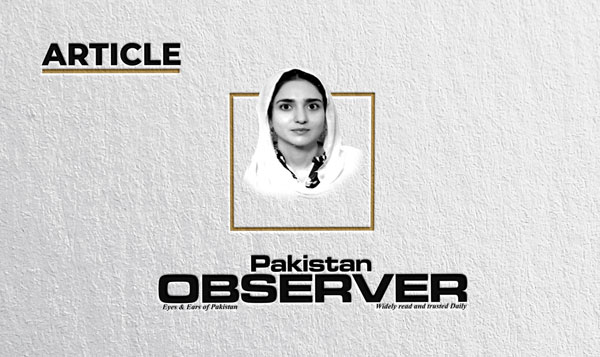Indo-Pak relations through human security prism
ANALYSING Indo-Pak relations from the perspective of human security might be challenging. Human security, as opposed to traditional state security, is concerned with safeguarding the safety and welfare of individuals rather than only the territory or sovereignty of a state. The impact of the Indo-Pak conflict on the populations of the two countries should be seen through the lens of human security. Since their independence from the British Empire in 1947, hostility, tension and mutual mistrust have defined the relationship between India and Pakistan. Over the years, the two nations have engaged in wars and skirmishes with the latest taking place in 1999 over the disputed territory of Kashmir. Concerns about both nations’ human security have been raised as a result of the Indo-Pak conflict.
The ongoing conflict between India and Pakistan has resulted in the loss of thousands of lives on both sides. Civilians of both countries’ border regions run the risk of getting caught in the cross-border firing. People from both sides have been displaced as a result of the violence, particularly in the disputed Kashmir area. Many families have been uprooted from Kashmir as a result of the bloodshed and insecurity that have plagued the region for decades. The economic growth of both India and Pakistan has been significantly impacted by the hostility between the two nations. The massive defence spending by both countries has frequently come at the expense of social development initiatives that could raise standards of living of the people. Therefore, analysing the Indo-Pak relations through the lens of human security highlights the need to prioritize the well-being and safety of civilians, and the need to address the root causes for the strained relationship of both countries.
Indo-Pak relations have always been seen through national security prism. This requires both countries to engage in cutthroat strategic tug of war without paying heed to human security concerns. The security intellectuals in the subcontinent have never been persuaded and have opposed any attempts to alter the conventional security discourse’s parameters. The development of the post-colonial state, the strategic environment, military alliances and regional diplomatic relations have all influenced the current security discourse. The domestic dimensions of human security have traditionally been subordinated to the nationalised dimensions of national security. India has recently allocated 1.62 trillion rupees (U.S. $19.64 billion) to purchase new weapons and platforms between 2023 and 2024. The annual budget for India for that fiscal year which was released on February 1, calls for a total expenditure of 45.03 trillion rupees.
An increase of 683.71 billion rupees, or around 13%, was made to the total defence budget from the previous fiscal year. The Stockholm International Peace Research Institute (SIPRI) stated in its annual report that India had the third largest military budget in the world last year, after the United States and China. Pakistan had also announced a PKR1.53 trillion (2022–23) defence budget (USD7.5 billion). The allocation represents a 12% rise over the initial military budget for 2021–2022, as well as a 3% increase over the revised budget for the previous year, which was PKR1.48 trillion.
The region’s human security may be significantly impacted by the increase in defence spending. First, a rise in defence spending might trigger an arms race between the two nations. This might lead to a switch in funding from social development initiatives to military spending which would be detrimental to both nations’ efforts to maintain human security. The financing for social development initiatives like education, healthcare and poverty eradication may be reduced as a result of the allocation of resources towards defence spending. Second, a rise in defence spending might further heighten tension between the two nations and spark new hostility, especially along the Line of Control in the contentious Kashmir area. Any escalation in hostility could result in casualties and forced migration on both sides, severely jeopardising regional human security.
Additionally, it can have greater regional and global effects. It might alter the balance of power in South Asia, raising questions about capabilities and intentions among surrounding nations. In the long run, this can further destabilize the area and put human security in danger. People-to-people interactions are one of the finest ways to foster trust and understanding between Pakistan and India. Programs for cultural interaction, intellectual exchanges, sporting events and tourism can all help with this. Reducing prejudice and fostering trust can be achieved by allowing inhabitants of the two nations to mingle, travel and learn about one another’s cultures.
Humanitarian aid could be given to the region’s most in need by Pakistan and India working together. Both nations frequently experience natural catastrophes, conflicts and poverty; therefore, both governments might work together to help those in need. Together, the two nations can advance human security in the area of health. By working together on research projects, exchanging knowledge and pooling resources, both nations can better their healthcare systems in the region and combat health issues like COVID-19. Border management is an important component of human security because both countries share a long and porous border. Reduced smuggling, human trafficking and other unlawful activities can be achieved with improved border control. Regular contact between the border security personnel of the two nations can improve collaboration and communication.
Unofficial conversations and negotiations between individuals and organisations from the two countries are part of track-II diplomacy. These discussions can help in finding points of agreement and encourage communication between the two countries. When official diplomatic communication has broken down, this kind of diplomacy can be especially helpful. In general, both India and Pakistan must make consistent efforts to improve their relations in terms of human security. While acknowledging and resolving the issues and problems that exist between the two countries, it is crucial to concentrate on shared values and potential areas of collaboration.
—The writer is a research officer at the Centre for International Strategic Studies (CISS) AJK.
Email: [email protected]










